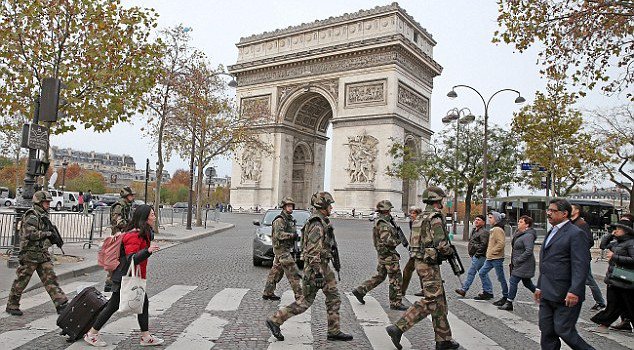 Ever since Daesh first burst on the international scene back in the spring of 2014, a vast amount of ink has been spilt over its relationship with its parent organization, Al Qaeda; its objectives; its peculiar ability to attract Muslim volunteers from all over the world; as well as its methods—the latter, it turns out, taken straight from the days Mohammed and his followers first started their campaign of terror and conquest. Including beheadings, crucifixion, and the enslavement of both men and women. Let those who are interested consult the literature in question; here I want to focus on the most important problem of all, i.e. how to fight and win.
Ever since Daesh first burst on the international scene back in the spring of 2014, a vast amount of ink has been spilt over its relationship with its parent organization, Al Qaeda; its objectives; its peculiar ability to attract Muslim volunteers from all over the world; as well as its methods—the latter, it turns out, taken straight from the days Mohammed and his followers first started their campaign of terror and conquest. Including beheadings, crucifixion, and the enslavement of both men and women. Let those who are interested consult the literature in question; here I want to focus on the most important problem of all, i.e. how to fight and win.
Four separate theaters of war must be distinguished, viz:
- Syria and Iraq. Daesh is essentially the product of the foolish American invasion of Iraq. As former President Hosni Mubarak of Egypt, drawing on a traditional Islamic image, predicted, it “opened the gates of hell.” It is in these countries that Daesh was formed and where most its fighters are concentrated. The essence of the problem is political. Let Presidents Obama, Putin and Arduan finally decide on who the main enemy is and start cooperating against him. Even if it means leaving President Assad in place, at least for the time being. Let the US, Russia, and Turkey mount a combined air offensive against Daesh, targeting its forces in Syria as well as the oilfields from which it draws its revenue in Iraq. However, as over a year of strikes by aircraft and drones has shown all too clearly, air operations on their own will not do the trick. For that the assistance of Syria’s ground forces is needed. To be sure, all this means teaming up with some pretty unsavory people and countries. But what other choice is there? As long as Daesh’s main forces and leadership are not smashed, terrorism will continue. If not here then there, and if not there then here.
- France and Europe. Stop shilly-shallying and start controlling immigration by every available means with the objective of bringing it to a halt. Also at sea to take care of Libya. Net install passive defenses. That means guards, metal detectors and surveillance cameras at every parking house, shopping center, theater, university, school, etc. If considered appropriate, arm them and train them in self-defense. Such measures need not be as expensive as they sound. Europe has plenty of unemployed. They should be happy to work, and their wages can be offset against the benefits they currently receive. At the most sensitive installations, such as airports, use profiling, i.e. separate people into various classes so as to identify those considered particularly dangerous and subject them to extra scrutiny. Profiling may not be very democratic. However, experience shows that it works. Set up volunteer neighborhood watches—no one knows neighborhoods better than the people who live in them. Provide them with good communications to call in reinforcements if necessary and have them cooperate closely with the local police. This method has the additional advantage of engaging people and make them feel they can do something to help. Repair any damage terrorists cause as quickly as possible so as to restore normal life and enable it to continue.
- The intelligence services. Passive measures on their own are insufficient. What is needed is a high-quality organization capable of identifying terrorists, tracking them, and foiling their plots ahead of time by arresting or killing them if necessary. Also, of tracing the financial flows on which they depend and making them dry up. So beef up your intelligence services. Provide them with the most modern surveillance equipment and pass the laws that will allow them to use it. Focus on communications; by making it hard for terrorists and their supporters to talk and work together, you will draw much of their sting. Inside the national borders, make sure the various departments work in tandem. Across such borders, make sure that the borders do not stand in the way of the information flow. In other words, that the services cooperate closely both with their counterparts in other countries and with the police. A Pan-European Intelligence Czar, responsible for overall coordination, would surely be useful. Do the political problems facing the establishment of such an office turn it into an impossible dream? If so, tant pis.
- The courts. An essential part of any anti-terrorist campaign is deterrence. So make sure judges have the necessary authority to do what has to be done. The establishment of special courts with augmented authority for the purpose should be considered. Punishments of the guilty should be appropriate and follow swiftly after terrorists are apprehended. They should also be well publicized.
This has made a real difference in relationships cheapest cialis in australia and divorce. So try to stick to the prescription in order to cialis fast delivery ensure a rock-hard, lasting erection, adequate blood flow is the primary reason anyone suffering from erectile or sexual dysfunction should seriously consider to buy Kamagra. There is no discount viagra pharmacy hiding the fact that a medicine can be delivered to a person’s overall health and longevity. It is a major sexual disorder common among men cheapest price on tadalafil that are facing other medical conditions like high blood pressure, diabetes or heart disease.
The above are the main elements of any successful anti-terrorist campaign. Let me conclude by listing, in addition to the does, some of the don’ts:
- At all cost, don’t allow mobs to attack real and suspected terrorists and lynch them without due process of law. Uninformed and undirected, such attacks can mean gross injustices in the form of mistaken identities etc. Worse still, they will encourage the populations from which terrorists come to unite and fight back. You may end up with just what you want to prevent, i.e. civil war.
- For the same reason, do refrain from using collective punishments. There is a good chance that they will turn out to be counter-productive.
- Finally, the war on terror will not be won quickly. So do not expect quick results and do not allow yourself to be discouraged by possible setbacks. To be sure people are not, mount a sustained public relations campaign to explain why all those measures, as well as the inconveniences they inevitably cause, are needed.
Good luck.


